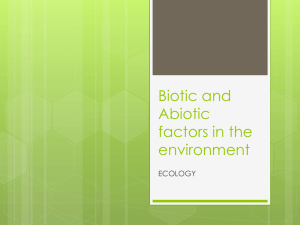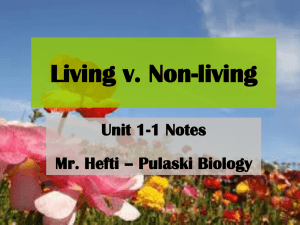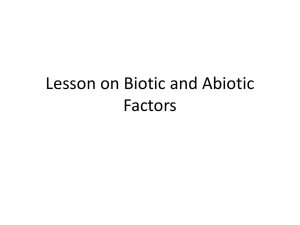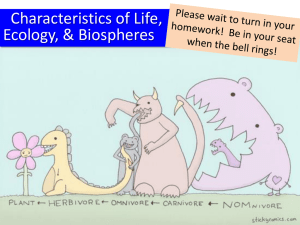Outdoor observation Lab
advertisement
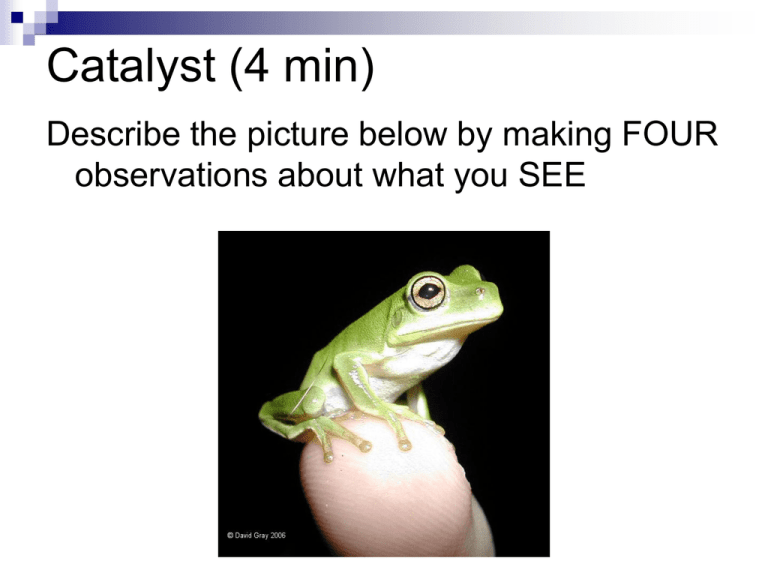
Catalyst (4 min) Describe the picture below by making FOUR observations about what you SEE Biotic vs. Abiotic Factors 9-21-10 Announcements IF THE CLASS BEHAVES IN THE HALLWAYS I REPEAT…IF, IF, IF…… EVERYONE IN THE CLASS BEHAVES….. THIS MEANS: You walk quietly, you stay on one side of the hallway, you stay with the group. THEN We will go outside to do a nature observation LAB Abiotic Factors Non-living factors that affect living organisms Examples: – pond, mountain Weather – clouds, sun Habitat Biotic Factors LIVING organisms Examples: Animals Plants Fungi Characteristics of Living Things Obtain and use energy Grow and develop Reproduce Respond to their environment Adapt to their environment Lab: Abiotic vs biotic Observation Abiotic without life. Example a rock. 1. 2. 3. 4. Biotic with life. Example a mouse. Observe around you quietly. Use your different senses : touch, hearing, vision,…. It is OK to touch the trees or shrubs, but don’t pick leaves or flowers! Write 10 biotic things on your T-chart. Things like grass, tree etc. Write 10 abiotic things on your T-chart Things like rock, brick etc. We must BE RESPECTFUL Walk quietly in the halls We must not disturb other classes We WILL go outside again if the class behaves NO leaving the group, no yelling, no loud voices, no littering, no cell phones out Pay attention to directions Do not stray far from the group You can touch things, but do not strip leaves from plants We still have things to finish after going outside, so we need to do our work quickly and come back quickly Exit Slip: Before you leave… Write your name on both the BLUE and GREEN post-its Write one of your BIOTIC things from your list on the GREEN post it and place it on the class t-chart Write one of your ABIOTIC things from your list on the BLUE posit it and place it on the class t-chart Extra credit Activity:do another nature observation in your neighborhood 1. 2. 3. 4. 5. 6. 7. 8. How many different shades of green did you see? Look closely at the leaves of the plants. Find one with dull leaves, one with shiny leaves, soft leaves etc. How many different leaf textures were you able to observe? How many of the plants are flowering now? How many of the plants have seeds on them? How many leaves are already turning Fall colors? Did you see any dead plants? What might have killed them? Does the ground look wet or dry? Do any of the plants seem unhealthy? Teacher only notes:Interactive things to do 1. 2. 3. 4. 5. 6. 7. 8. 9. 10. 11. Unearth a rock with bugs-what is biotic here Pick up a fallen stick, dried fallen leaf are these abiotic or biotic Cut a leaf off a plant is the leaf biotic or abiotic—when did it become abiotic Bigger question-when is a part of a plant alive and when is it dead Get some soil are there living things and non living things mixed in here Put some pond water in a jar—are there living and non living things in here Seeds that have fallen like the leaf and the stick, are they biotic or abiotic. If answer is biotic, why are the stick and the leaf from 2 biotic also? Bark on the tree trunk abiotic or biotic, bark that I peel off biotic or abiotic, when did the bark die?? The energy/warmth from the sun-- abiotic or biotic Wind on our faces-biotic or abiotic? How do we know where life begins and ends? Lab: Abiotic vs biotic Observation Biotic with life. Abiotic without life. Example a rock. 1. 2. 3. 4. Example a mouse. Observe around you quietly. Use your different senses : touch, hearing, vision,…. It is OK to touch the trees or shrubs, but don’t pick any leaves or flowers! Write 10 biotic things on your green sheet. Things like grass, tree etc. Write 10 abiotic things on your blue sheet. Things like rock, brick etc.

